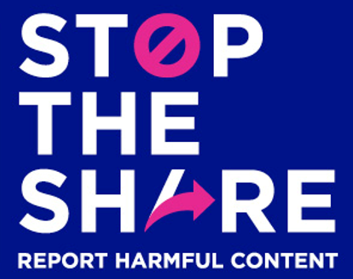WCED launches anti-bullying campaign: #StopTheShare
Statement by Minister Debbie Schäfer, Minister of Education Western Cape
WCED launches anti-bullying campaign: #StopTheShare
One of the most prevalent forms of bullying is social media bullying, otherwise known as cyber-bullying – whereby hundreds (if not thousands) of people can share or like a post that can be harmful to you or another person.
The responsible thing to do when seeing or receiving such a harmful post is to stop it from being shared elsewhere, either by deleting the post or to “Stop the Share” completely by reporting harmful content. However, many people are unaware how to do this.
As an education awareness campaign, the WCED has created resources that highlight the harm we do by simply liking, sharing, or commenting on a harmful post. We have also created a set of online videos to show learners and the general public, exactly how to #StopTheShare for this type of harmful content.
The videos can be viewed at: Anti-bullying | Western Cape Education Department
Why an anti-bullying campaign?
The campaign was initiated in memory of a Limpopo school learner, Lufuno Mavhunga. Lufuno, who was in Grade 10, was hit by another learner and this incident was captured on camera. It was subsequently shared on social media platforms. The video went viral, and Lufuno sadly took her own life shortly after the incident.
Unfortunately, there are many other learners like Lufuno in our province and across the country who are victims of bullying at school, in their community and on social media. Bullying can be verbal, physical, and/or via a third party. No matter what shape or form it takes, others should not be contributing towards it!
Any learner, or parent of a learner, who has gone through such abuse knows the pain and trauma it can cause. It can lead to depression, anxiety, self-harm, and in some cases, even suicide. The use of social media has heightened these risks.
Learners are using various social media platforms to tease, embarrass, intimidate, or torment other learners. The sad reality is that it involves thousands of learners who are either posting, sharing, or commenting on videos, photos or messages that damage the reputation or confidence of others.
While the actions of the bully are unacceptable, the actions of the hundreds or thousands of people who share, like, or comment on the content, are similarly unacceptable.
While the campaign is initiated by the WCED, it not only targets learners, but anyone who is using their social media statuses to perpetuate bullying and harm.
It is time for all of us – whether we are 10, 20, or 50 years old – to #StopTheShare, and report harmful content, in support of the victim, and stop the abuse they continue to suffer.
Our previous campaign: “Raise your Voice, Not your phone”
This campaign follows on from our previous successful anti-bullying campaign which highlighted the effects of bullying on learners, as well as drawing attention to the fact that learners who film, post or distribute videos are also participating in the bullying. The message is that the actions of bystanders, and the fact that if they film and distribute videos of abuse, is also a form of bullying.
The “Raise your Voice, Not your phone” campaign went viral through various social media platforms and was awarded a merit award at the One Show Awards in New York in 2019. The One Show Awards is one of the most prestigious international awards competitions in advertising, design, interactive and branded entertainment. The campaign also won a silver and a bronze award at the IAB Bookmark Awards.
The video below outlines what the campaign entails and how it is being expanded into the school curriculum:
https://www.youtube.com/watch?v=CxQtJUOrM_c#action=share
What else is the WCED doing to support anti-bullying?
In addition to the campaigns, the WCED has a cyber-wellness programme that aims to ensure that learners and educators are more aware of their digital footprint and the infinite potential of the cyber world to have both positive and negative impacts.
The WCED has issued several guidelines on e-Safety in schools such as Educating towards responsible and ethical use of ICT in education, Guidelines on Cellular phones and other mobile technologies in public schools, and Guidelines on Social Media and Networking in Public Schools. These and many more can be accessed at:
https://wcedonline.westerncape.gov.za/elearning-guidelines-and-workbooks.
The WCED has also worked with Google to develop an Online Safety Curriculum Guideline that seeks to teach learners the fundamentals of digital safety and are grade specific. The lessons have been rolled out through the Life Orientation programme.
There are also numerous anti-bullying campaigns at both district and school level and a Positive Behaviour programme that supports positive behaviour and life choices.
The WCED liaises within with Safe Schools to supplement the services from department-employed psychologists and social workers by working with the Department of Health, Department of Social Development, and NGOs (such as CASE in Hanover Park/Manenberg).
In cases where learners are manifesting symptoms of depression, and may even be at risk of a possible suicide attempt, schools should contact the psychologist or social worker allocated to their school by the district support team. In the case of a more urgent referral, schools, parents, and/or learners may call the WCED SAFE SCHOOLS Call Centre [0800 45 46 47] toll free for assistance in locating immediate support.
In addition, the South African Depression and Anxiety Group (SADAG) offers a 24 HOUR HELPLINE [0800 12 13 14] as well as a SUICIDE EMERGENCY NUMBER [0800 567 567]. Learners and/or parents can use these numbers if they feel that the child needs immediate assistance (often after school hours).
Media Enquiries:
Kerry Mauchline
Spokesperson to Minister Debbie Schäfer
Western Cape Ministry of Education
Kerry.Mauchline@westerncape.gov.za






